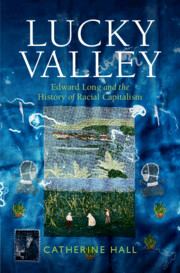Book contents
- Reviews
- Lucky Valley
- Critical Perspectives on Empire
- Lucky Valley
- Copyright page
- Dedication
- Contents
- Colour Plates
- Figures
- Maps
- Acknowledgements
- A Note on Language
- Prologue
- Maps and Family Tree
- Introduction
- Part I Growing up English
- Part II The Lineaments of Racial Capitalism
- Part III Making a Slave Society
- 6 Colonizing Geographies
- 7 Colonizing the State
- 8 Theorizing Racial Difference
- Epilogue
- Bibliography
- Index
- Plate Section (PDF Only)
6 - Colonizing Geographies
from Part III - Making a Slave Society
Published online by Cambridge University Press: 11 January 2024
- Reviews
- Lucky Valley
- Critical Perspectives on Empire
- Lucky Valley
- Copyright page
- Dedication
- Contents
- Colour Plates
- Figures
- Maps
- Acknowledgements
- A Note on Language
- Prologue
- Maps and Family Tree
- Introduction
- Part I Growing up English
- Part II The Lineaments of Racial Capitalism
- Part III Making a Slave Society
- 6 Colonizing Geographies
- 7 Colonizing the State
- 8 Theorizing Racial Difference
- Epilogue
- Bibliography
- Index
- Plate Section (PDF Only)
Summary
Long was committed to a depiction of Jamaica as a successful ‘commercial society’ where white people could live comfortably on the labour of the enslaved. He mapped the island for his readers in such a way as to reassure them that the boundaries between the free and the unfree were secure. His picture provided a full account of island defences, against both external and internal enemies. He drew on his favourite English poets and writers to inspire poetic renditions of the beauties of this tropical paradise in which art and nature combined their glories. The island’s fecundity was there to be harnessed for profit. His racialized cartography utilized maps, engravings, tables and listings of commodities to illustrate boundless potential. Nature could be improved, tamed and catalogued, as people were. Alarming tales of colonists’ mortality could be challenged, mosquitoes kept at bay. White settlers could live a healthy life if only they would embrace moderation in all things. As an Enlightenment man and an enthusiastic reader of natural histories, Long was keen to represent the island as en route to a more civilized and ordered state, with more roads, more maps, more barracks, more settlements. But, he had to admit, it was a society sorely in need of more public virtue.
- Type
- Chapter
- Information
- Lucky ValleyEdward Long and the History of Racial Capitalism, pp. 265 - 312Publisher: Cambridge University PressPrint publication year: 2024

